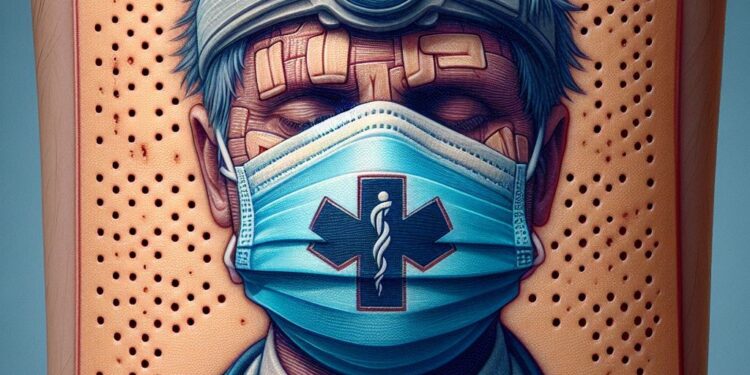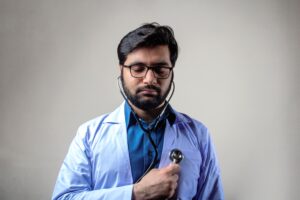
This whole, “you doctors need more resilience” mantra annoys me. I apologize if this offends, but that “Physician heal thyself” idea is misguided at best; dangerous, or even immoral at worst. Mandatory physician resilience programs, springing up like mushrooms, are a sticking plaster to avoid dealing with the fungating tumor underneath. In this article, I argue that physician burnout resilience programs are to quote Linda Dorzdowicz, MD, “Lipstick on a pig”.
The first few drafts of this post were less polite. What follows is an essay from the heart.
Following on from feedback, I want to make clear that, of course, resilience programs have their place. Despite being full of grit and determination, very few of us are born with the resilience to handle all that medicine brings. If they are offered by your organization or outside, please do explore them.
There is no shame in skilling up for the battle ahead.
In no way do we want to deter colleagues from engaging with high quality, meaningful, clinician-focused programs, like those we discuss in this linked article.
Similarly, if you need clinical help, you need to take it. Whether it’s a Practitioner Health Program or other, Physician Health Thyself does not apply if you need clinical care.
Please feel free to skip over this rant straight to our Resources for Enhancing Physician Resilience post, or check out our FREE anonymous doctor-only Peer Support Groups: no name, no shame.
Our groups facilitated by MDs or therapists or both. They are not state-sponsored or licensing board-mandated physician burnout resilience programs. Our online resources are for doctors by doctors, offering in safety, confidentiality, and anonymity.
Physician resilience programs, springing up like mushrooms, are a sticking plaster to avoid dealing with the fungating tumor underneath" - Dr Corrigan MD
In a toxic system, you could have the most serene Jedi-like physicians, but against the might of the machine, many will suffer unnecessarily. Some of us will not survive: about 300-400 physicians a year take their own lives (that’s about one a day, including weekends — of course). And many more patients will be harmed.
We have to talk openly about the demands of modern medicine and how these are hurting the healers we need the most.
As burnout guru Dr Tait Shanafelt, M.D. stated so cogently: “We need to stop blaming individuals and treat physician burnout as a system issue … If it affects half our physicians, it is indirectly affecting half our patients.”
Consequently, the trend toward offering physician burnout resilience programs is like prescribing antibiotics for a viral infection. Expecting physicians to take on more, to find acceptance in an unacceptable situation, to ‘bounce back’ from unacceptable circumstances is plain wrong in my opinion.
“We need to stop blaming individuals and treat physician burnout as a system issue … If it affects half our physicians, it is indirectly affecting half our patients" -Tait Shanafelt, M.D.
I and many others maintain that is not physicians (and I include all healthcare staff here) who need to further enhance their resilience.
With rare exceptions, we are a resilient group. Heck, having survived medical school and board exams, dangerously high working hours, a largely compassionless healthcare system, and the daily tension between patient needs and available resources, we would have to be. While we do have some part to play inasmuch as any human can, it is the system that needs to stop pushing their valuable employees beyond breaking point. And the system also needs to make it easier to help people who are near breaking point before they snap. Before their lives crash. Before patients are harmed.
As Danielle Ofri MD, PhD so cogently argues in her excellent 2019 piece, “The Covenant”, most doctors are not traditionally burned out — we love taking care of patients and want nothing more than to be able to do just that — yet we are in agony. She argues that the Covenant between physicians and the medical profession has been broken.
“The source of the agony is the profession — or rather the corporatization of the profession –that has so impinged upon the doctors’ ability to practice medicine. Doctors placed their trust in the medical profession, but that trust has been roundly trounced. So, rather than prescribe Pilates classes for overstressed doctors, it is time for the medical profession and the health care industry that has subsumed it-to get a check-up.”
The system needs more compassion to start, and a full overhaul to become suitable for human use.
...rather than prescribe Pilates classes for overstressed doctors, it is time for the medical profession-and the health care industry... to get a check-up" - Dr Danielle Ofri MD, PhD

Sure, we can (and should) exercise, eat healthily, take vacations, and meditate. We can try to set work-life boundaries and aim to achieve the right balance for us. We can connect with others, keep gratitude journals, limit our alcohol intake. These are all Good Things for our health.
We can and should also engage in the prescribed resilience training or mandatory coaching. We could even access coaching, therapy, or other approaches to enhance our self-understanding, coping skills, and overall well-being.
But those are tools for improving well-being and not preventing burnout. What is needed are upstream strategies that address the roots of the causes, not downstream tactics that address only the symptoms.
Without structural change, these are like teaspoons against the tide. No amount of resilience training can defend against that. Our system is built on performance and perfection rather than compassion and humanity.
So that leaves us with bright, hard-working, dedicated people being used by a system that largely doesn’t care about them. These same people are usually conscientious, caring, and perfectionists. Nice people. The kind of people that you would like to be your doctor.
The great American public has been fed unrealistic expectations, and as a result, is perhaps the most litigious on the planet. The only people benefitting are the lawyers, bless them.
The public has a right to expect high-quality medical care. Heaven knows they pay enough for it. But nothing in life is without risk, especially in medicine. Even laying in bed has its risks to be balanced against getting up. Some days I am prepared to gain weight and risk DVT for the pleasure of a duvet day. But I still gotta get up because my patients need me, we are short-staffed, and no one else can/will cover my shift.
And as a result of our vocational dedication, we are burning out, getting sick, and making more mistakes as a result.
Sure, we can (and should) exercise, eat healthily and meditate. We can try to set work-life boundaries and aim to achieve the right balance for us. We can connect with others, keep gratitude journals, limit our alcohol intake. These are all Good Things for our health.
Certain sources of psychological stress are an inherent part of a physician’s job: not every patient can be healed; life or death decisions will need to be made without enough information; resources are finite; some patients/families will assume that any adverse outcome is the result poor care. Ambulance-chasing lawyers abound.
The triple Damoclean swords of career-limiting moves, State Licensing Boards, and increasing patient expectations hover over every physician’s career.
These are sources of unavoidable suffering, and because they cannot be prevented, the goal of health care organizations should be to minimize the harm they cause. Of course, management should ensure the lowest risk of such events, and look after their doctors when they inevitably do occur. Resilience training makes sense as part of a response to unavoidable suffering.
But other sources of suffering clearly are avoidable.
These include overwork and understaffing, a hostile work environment, unsafe working conditions, and failure to provide the resources doctors need to provide safe care. Avoidable suffering can be eliminated, and so the primary goal should be prevention.
Prevention interventions should focus on systems improvement, not solely on individual resilience.
And, while the best current evidence is limited, what we know about interventions to reduce burnout suggests that approaches targeting organizational improvements are more effective than those that focus on physicians themselves.
The triple Damoclean swords of career-limiting moves, State Licensing Boards, and increasing patient expectations hover over every physician's career.
Individual physician resilience is not solvable by mandatory physician burnout resilience programs or classes, mindfulness, more exercise, yoga, or corporate team-building.
In Part 2, I continue my rage against the medical machine, and suggest that the problem is not a lack of yoga classes. It’s a systemic problem that requires structural changes.
What do YOU think needs to change?
